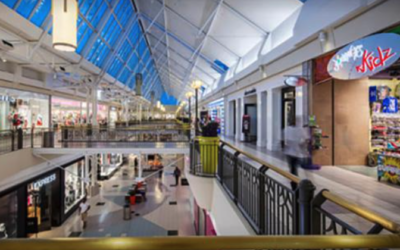Retail Business Picking Up
Commercial real estate execs see business rebounding during first quarter of 2021 despite recent bankruptcies and store closings.

The bruised and battered retail real estate industry in Atlanta is beginning to see a brighter future during the first quarter of 2021. That’s despite an abundance of leasing signs in retail locations around the metropolitan area and frequent announcements of retail bankruptcies and going-out-of-business sales.
Leo Wiener, president of Ackerman Retail, credits government stimulus packages for unleashing a lot of pent-up demand after the initial shocks of the past year. Ackerman has seen business pick up dramatically in recent months, Wiener said.
“The third and fourth quarter were a lot stronger in 2020. It surprises people when I say from our service standpoint, we had a slightly better year in 2020 than before the pandemic in 2019.”
Notwithstanding Wiener’s optimism, last year was a dismal year for many businesses that were once household names.
According to Foresight Research, 30 retailers and restaurant chains declared bankruptcy in 2020, which resulted in a record for individual retail closings. Such venerable names as Lord & Taylor, J.C. Penney, Neiman Marcus and Brooks Brothers sought bankruptcy protection.
According to the National Restaurant Association, 110,000 restaurants permanently closed last year, and that trend is continuing in the new year.

Jack Halpern is chairman and CEO of Halpern Enterprises, which has a long history in local retail real estate. He maintains that it’s not all gloom and doom.
“I don’t believe the downturn is a permanent change. In fact, some segments of retailing have actually done better during the pandemic, like grocery stores, home improvement stores and stores that sell furniture and accessories and things for the home have done better because people are spending more time at home.”
The upscale furniture retailer RH has seen its stock rise 270 percent in the last year and is even planning an expansion internationally this summer.
The company, formerly Restoration Hardware, rebranded itself in 2012 and began building lavish, free standing locations such as its massive new building on Peachtree Road in the heart of Buckhead that opened in 2014. The company labels its showrooms as galleries.
RH CEO Gary Friedman, in an earnings call in September, was blunt in describing the company success despite hard times.
“We are not building [expletive] little crappy retail stores. … We are developing buildings.”
His buildings, as he describes them, offer decorating ideas, an immense, lavishly produced catalogue that is designed to inspire a home filled with RH offerings, and a comfortable, low-key environments that serve snacks and coffee.
The growth of these kinds of experiential retail approaches is seen as crucial to the survival of the once all-powerful regional shopping malls that have fallen on hard times. Still Wiener, the Ackerman’s retail exec, sees a dark future for these sprawling, multi- level, enclosed structures.

“I’d be shocked to see new malls built in Georgia, maybe ever. We just recently had North Point Mall in Alpharetta go back to the lender. I understand Town Center in Kennesaw is going back to the lender. It may help to reset the locations to do something a little bit more interesting or it may offer an excuse to tear down part of it and build, perhaps multifamily residences there. A few like Lenox and Perimeter Mall will survive, but we won’t have one every 10 miles apart like we used to.”
According to retail market trends, what are expected to do well as the economy returns are retail locations that offer a unique, and often more personal shopping experience.
Jack Halpern’s wife, Lynne, has a women’s jewelry and accessories shop, Tassels, which he said had its best year ever in 2020. He believes the store is thriving because people are looking to get a psychological boost during these difficult times.
“People haven’t been spending money on luxury travel or expensive clothes and had more discretion, more money to spend on a discretionary basis. And buying jewelry was something that made them feel good.”

Wiener at Ackerman is putting together a 475,000-square-foot mixed-use development in what was once considered a non-traditional location on the south side of Atlanta, and he’s been working with an out-of-town company to fill up several vacant Stein Mart locations with individual small business boutiques selling locally produced products. Well capitalized operators with unique ideas are beginning to tiptoe, as he sees it, back to the Atlanta market.
“I think there’s a lot of debate as to what retailing looks like moving forward. But one thing is certain, you’ve got to give the consumer lots of choices and not be stuck in an old mature model that’s just not bulletproof at this point.”



comments